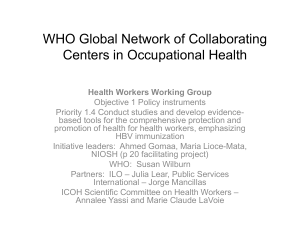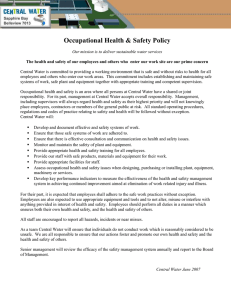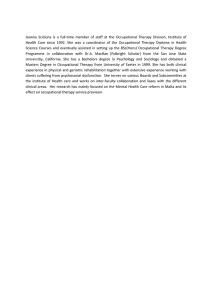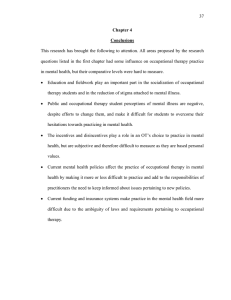Occupational Health of Health Workers Workshop
advertisement
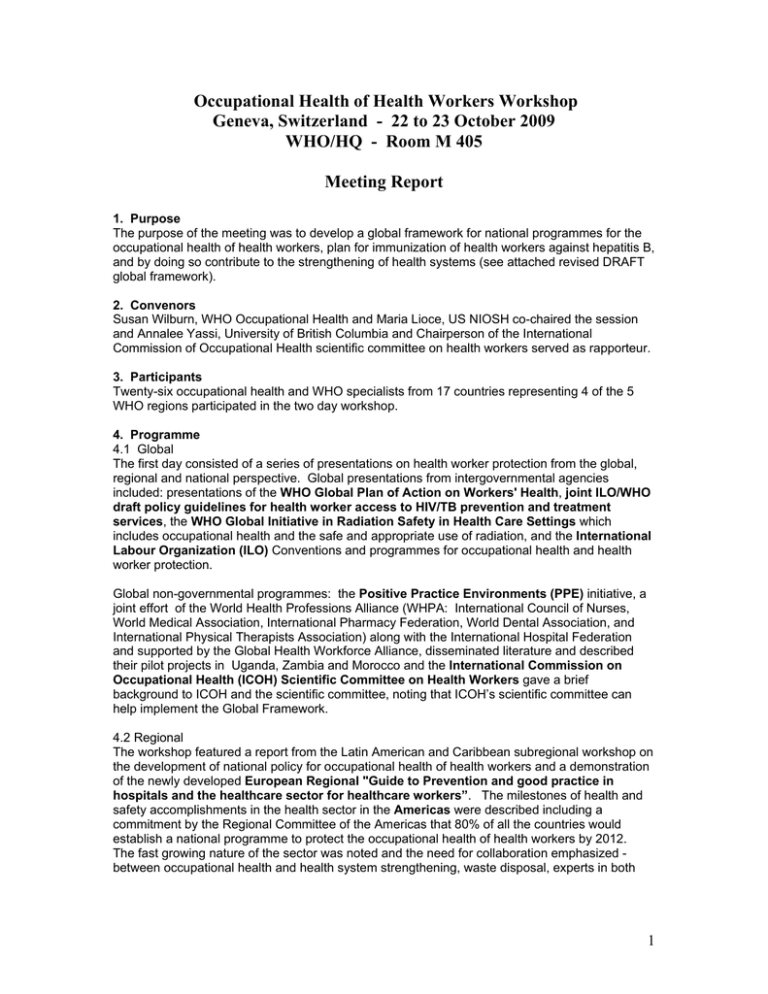
Occupational Health of Health Workers Workshop Geneva, Switzerland - 22 to 23 October 2009 WHO/HQ - Room M 405 Meeting Report 1. Purpose The purpose of the meeting was to develop a global framework for national programmes for the occupational health of health workers, plan for immunization of health workers against hepatitis B, and by doing so contribute to the strengthening of health systems (see attached revised DRAFT global framework). 2. Convenors Susan Wilburn, WHO Occupational Health and Maria Lioce, US NIOSH co-chaired the session and Annalee Yassi, University of British Columbia and Chairperson of the International Commission of Occupational Health scientific committee on health workers served as rapporteur. 3. Participants Twenty-six occupational health and WHO specialists from 17 countries representing 4 of the 5 WHO regions participated in the two day workshop. 4. Programme 4.1 Global The first day consisted of a series of presentations on health worker protection from the global, regional and national perspective. Global presentations from intergovernmental agencies included: presentations of the WHO Global Plan of Action on Workers' Health, joint ILO/WHO draft policy guidelines for health worker access to HIV/TB prevention and treatment services, the WHO Global Initiative in Radiation Safety in Health Care Settings which includes occupational health and the safe and appropriate use of radiation, and the International Labour Organization (ILO) Conventions and programmes for occupational health and health worker protection. Global non-governmental programmes: the Positive Practice Environments (PPE) initiative, a joint effort of the World Health Professions Alliance (WHPA: International Council of Nurses, World Medical Association, International Pharmacy Federation, World Dental Association, and International Physical Therapists Association) along with the International Hospital Federation and supported by the Global Health Workforce Alliance, disseminated literature and described their pilot projects in Uganda, Zambia and Morocco and the International Commission on Occupational Health (ICOH) Scientific Committee on Health Workers gave a brief background to ICOH and the scientific committee, noting that ICOH’s scientific committee can help implement the Global Framework. 4.2 Regional The workshop featured a report from the Latin American and Caribbean subregional workshop on the development of national policy for occupational health of health workers and a demonstration of the newly developed European Regional "Guide to Prevention and good practice in hospitals and the healthcare sector for healthcare workers”. The milestones of health and safety accomplishments in the health sector in the Americas were described including a commitment by the Regional Committee of the Americas that 80% of all the countries would establish a national programme to protect the occupational health of health workers by 2012. The fast growing nature of the sector was noted and the need for collaboration emphasized between occupational health and health system strengthening, waste disposal, experts in both 1 non-communicable disease and communicable diseases and especially forging alliances with patient safety. 4.3 National programmes to protect health workers included presentations from Egypt, Thailand, Venezuela and Vietnam. A collaborative and interdisciplinary partnership model was described as key to the success in Venezuela along with seizing the opportunity presented by new labour legislation requiring health and safety committees in the health sector. Leadership in countries from the WHO Collaborating Centers in Occupational Health and other Institutes for graduate studies in occupational health solidified capacity building, scale-up and sustainability of the successes. Collectively the presentations provided from WHO programmes, as well as ILO, PPE, ICOH, the Americas (PAHO) and European Regions, and four countries provided a strong background for the discussions that occurred in small groups and in plenary that led to the development of the Global Framework for National Programmes for Occupational Health of Health Workers. 5. Part 2: Hepatitis B immunization campaigns The second part of the workshop was devoted to organizing campaigns to immunize health workers against the hepatitis B virus. WHO reported on the global burden of hepatitis B and C disease from sharps injuries to health workers which was followed by two presentations. The first presentation, from the regional perspective, described how health worker immunizations were integrated into the Immunization Week of the Americas in 2009 and demonstrated tools and resources for immunization campaigns. This was followed by a presentation from the global health worker trade union, Public Services International (PSI) describing PSI's campaign to negotiate immunization into collective bargaining agreements and to assist with awareness raising and mobilizing the workforce for the success of immunization campaigns. Issues, barriers, solutions, and identification of targets for immunization campaigns and funding opportunities were discussed. Commitments were made from the group and partnerships established to pursue this initiative in Africa, south-eastern Europe, Egypt and the Americas. 6. Outcomes The draft framework was circulated and revised based on comments from the participants and subsequently, on 2 December, a second workshop to plan for the implementation of the global framework was held as part of the ten year anniversary of the Safe Injection Global Network (SIGN). During the second meeting, the participants supported the revised framework and recommended that ILO and WHO explore its further development as a joint WHO/ILO effort. 2 Global Framework for National Occupational Health Programmes for Health Workers The purpose of this Global Framework for National Occupational Health Programmes for Health Workers as directed by the WHO Global Plan of Action (GPA) on Workers’ Health is to strengthen health systems and the design of healthcare settings with the goal of improving health worker health and safety; patient safety and quality of patient care; and ultimately support a healthy and sustainable community. The Ministry of Health will need to consult and work together with other relevant Ministries on the development of the National Occupational Health Programme for Health Workers such as the Ministry of Labour, Social Security, and/or other organization(s) responsible for the protection and promotion of health worker health and safety in the private as well as public sector. 1. Identify a responsible person with authority for occupational health at both the national and workplace levels. 2. Develop a written policy on safety, health and working conditions for health workforce protection at the national and workplace levels. 3. Establish and provide access to Occupational Health Services and allocate sufficient resources/budget to the program, occupational health professional services, and the procurement of the necessary personal protection equipment and supplies. 4. Create joint labour-management health and safety committees, with appropriate worker and management representation. 5. Provide ongoing (or periodic) education and training that is appropriate to all to all parties, including occupational health practitioners, senior executives, front-line managers, health and safety committees, front-line workers, and the general public. 6. Identify hazards and hazardous working conditions to prevent and control hazards and manage risks by applying the occupational hygiene hierarchy of controls, which prioritizes elimination or control at the source. 7. Provide immunization against hepatitis B and other vaccine preventable diseases at no cost to the employee and ensure all three doses of the hepatitis B immunization have been received by all workers at risk of blood exposure (including cleaners and waste handlers). 8. Promote exposure and incident reporting, eliminating barriers to reporting and providing a blamefree environment. 9. Promote health worker access to diagnosis, treatment, care and support for HIV, TB and hepatitis B and C 10. Utilize appropriate information systems, to assist in the collection, tracking, analyzing, reporting and acting upon data to promote health and safety of the healthcare workplace and health workforce 11. Ensure that health workers are provided with entitlement for compensation for work-related disability in accordance with national laws. 12. Promote research on OHS issues of concern to health workers, particularly with respect to combined exposures and applied intervention effectiveness research. 3 4
